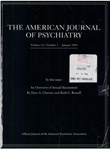Patients who use drugs during inpatient substance abuse treatment
Abstract
OBJECTIVE: Drug use by patients during inpatient substance abuse treatment is frequently a cause of premature hospital discharge. The authors examined the histories of patients who used drugs while in inpatient substance abuse treatment, the methods used to detect drug use, and the temporal relationship of drug use episodes. METHOD: The authors reviewed the charts of patients admitted consecutively to an inpatient substance abuse treatment unit between 1981 and 1988. Of 729 patients, 42 were found to have used drugs while receiving inpatient treatment. The diagnoses and clinical histories of these 42 patients were compared with those of all other patients. Methods of detection and circumstances of drug use were recorded, and drug use episodes were plotted on a time line that was examined for temporal clustering. RESULTS: Significantly more of the patients who used drugs during inpatient substance abuse treatment had primarily used heroin or methadone before treatment. Random urine screens, self-report, and staff observation together detected approximately 85% of the patients who used drugs during treatment. Episodes of drug use did cluster in time, but within clusters the hospital stays of the patients who used drugs did not necessarily overlap. CONCLUSIONS: Temporal clustering of drug use episodes may occur because drug use by one patient heralds drug availability and stimulates craving in other inpatients. Clinicians should be aware that one episode of drug use may be followed by others. Multiple detection methods, including random comprehensive urine screens, should be used to test for drug use on inpatient units.
Access content
To read the fulltext, please use one of the options below to sign in or purchase access.- Personal login
- Institutional Login
- Sign in via OpenAthens
- Register for access
-
Please login/register if you wish to pair your device and check access availability.
Not a subscriber?
PsychiatryOnline subscription options offer access to the DSM-5 library, books, journals, CME, and patient resources. This all-in-one virtual library provides psychiatrists and mental health professionals with key resources for diagnosis, treatment, research, and professional development.
Need more help? PsychiatryOnline Customer Service may be reached by emailing [email protected] or by calling 800-368-5777 (in the U.S.) or 703-907-7322 (outside the U.S.).



